SUMMARY
This is AI generated summarization, which may have errors. For context, always refer to the full article.
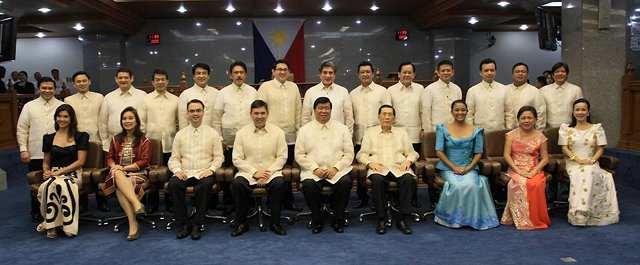
MANILA, Philippines – “Crazy, toxic, a pressure cooker.” This was the year for lawmakers in an institution battered, black and blue.
“The Senate was the most active beat this year,” Senate President Franklin Drilon told reporters in jest during a Christmas lunch. It was another way of saying that his was the most notorious agency of 2013.
With the fund controversy, endless leadership coup rumors, a threat and finally a resignation, a brutal election, the pork barrel scam and personal animosities, “eventful” is an understatement. What do the controversies mean for the senators with so-called old names and new faces, and what is next for the tainted body?
We caught up with some Senate leaders and newbies of different political stripes for introspection. They are some of the closely watched personalities whose stories defined 2013, and whose political fortunes are already being linked to 2016.
What was 2013 like and how will it shape the coming years? Don’t take our word for it. Here is the year in senators’ eyes.
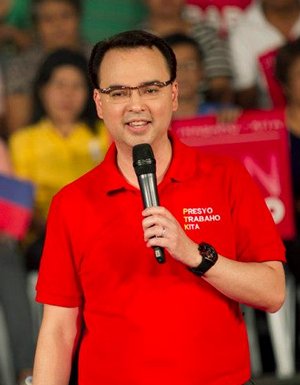 Alan Peter Cayetano: Senate’s second trial
Alan Peter Cayetano: Senate’s second trial
Q: You said that the atmosphere in the Senate was uncomfortable and toxic in 2013. What do you mean by that?
A: Napakaraming challenges. This year, it was very challenging kasi mismong mga miyembro ng Senado ang inuusig, and we had to decide whether we will allow other bodies to investigate or whether kami na mismo or both, and that took its toll on the ratings. The mere fact na meron ding miyembro involved took its toll on the ratings at nasamahan pa ito ng iba’t ibang kalamidad at trahedya.
(There were so many challenges. It was very challenging because the members of the Senate themselves were implicated and we had to decide whether we will allow other bodies to investigate or investigate ourselves, or both. The mere fact that there were members involved took its toll on the ratings, on top of other calamities and tragedies.)
I do believe mataas pa rin ang trust at pagtingin ng maraming tao sa mga individual senators but sa institutsyon mismo, tinamaan nga rin ito. My prayer is that any devastation, problems, challenges in 2013, it will be solved in 2014. But any success, because there were also successes in 2013, it will be replicated or amplified in 2014.
(I do believe people’s trust and confidence in individual senators is still high but in the institution itself, that took a hit.)
I think 2013 is about humans making mistakes, communities making mistakes, sometimes being unprepared, sometimes looking the other way here in Congress and whatever it is will come back to bite you and the institution. It’s really learning and doing better.
For me, it’s not whether the Senate was successful or not in 2013, but how we can be more relevant in 2014, how we can address the problems like rising energy prices, and really make people feel someone is fighting for you.
Q: You talk about controversies affecting the institution. You’ve been here since 2007. How different was 2013 for the Senate?
A: ‘Yung may magbabangayan (that there is bickering) or that there will be a debate among senators is normal. People just forget about that. It happened in almost all Congresses that I was there but the difference is as an institution, we’re used to being the ones trusted and being the ones doing the investigation.
In 2013, it was the senators themselves or some senators being investigated and the Senate was in effect also under trial. This is the second time, because in the impeachment trial of [former] Chief Justice [Renato] Corona, we felt we were on trial but we passed that.
But when it came to [Janet] Napoles, PDAF (Editor’s note: Priority Development Assistance Fund or pork barrel), the funds of the Senate, the ratings will show that people were not happy [with] the way senators conducted themselves individually and as an institution.
We tried to act fast. The hearings were done openly. Ms Napoles was brought here. We’re hoping we can all learn from this process and we’re hoping that the Senate can be insulated because we cannot effectively investigate others if we’re not transparent and accountable ourselves.
Q: Speaking of bickering, how is your relationship now with Senate Minority Leader Juan Ponce Enrile?
A: Hindi kami best friends pero ‘di naman kami enemies. I grew up with him so before, parang tatay ang tingin but then after the 2010 elections then going to 2013, very personal ang attacks niya sa members namin when I was in the minority and then there were very tough questions thrown [at] each other and basically I don’t agree with his politics.
(We are not best friends but we’re also not enemies. I used to treat him like a father but then his attacks on our members when I was in the minority got very personal.)
But I can work with him. I can be a statesman. I can be a friend but maybe there is already a line draw but we’re all human and we also have to humble ourselves and see our own mistakes.
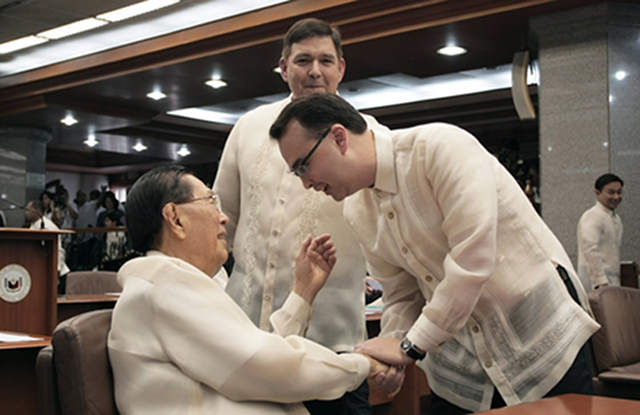
Q: What are your plans for and expectations of 2014?
Very high because the expectations of the Senate will come from the needs of our people. The end of 2013 will show that people need so much from us. Just now that the year is ending, people need us to address the high prices of electricity, whether the LRT fares will go up or not, how to take care of Yolanda [victims].
There’s so much work, so much needs, much expectation from our people. Yes, the economy is doing much better but the needs now are also much greater, the challenges. But there’s light at the end of the tunnel because if done correctly, it can lead to progress, if we build better than before. But how do we work with NGOs? The private sector? [Rehabilitation czar] Secretary [Panfilo] Lacson? With the president? The media? The international organizations like the UN? So these are all challenges.
The legislative process is just starting. Many bills are still without a committee report. The elimination of the PDAF, the call of the people that the legislative process mature, that the senators and congressmen stick to policy, new laws, evaluating old laws will breathe new life into the halls of the Senate, especially we have a lot of young and new members so you’ll see more lively debates once these legislative proposals are brought to the floor.
Grace Poe: The top-notcher’s baptism of fire 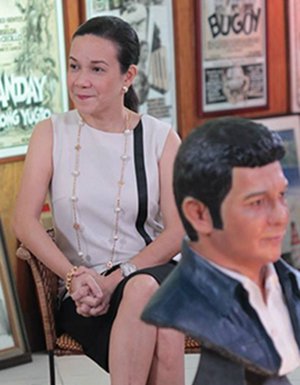
Q: What did 2013 mean to you?
A: I was elected senator of the Philippines in 2013 and for that I will always be grateful for the overwhelming support manifested by the Filipino electorate. 2013 was a baptism of fire, of challenges and opportunities to be the voice of our people.
This was the year I was given the chance to push changes in our system and sponsor the Freedom of Information (FOI) bill in the Senate, which we hope to pass in 2014.
Q: 2013 was the year you topped the senatorial race, what analysts called the biggest surprise of the election. What was the experience like?
I’m still awed and humbled by it. I am very grateful for the people who placed their trust in me. I know that people believed in me because I am the daughter of FPJ (Editor’s note: the late actor and 2004 presidential candidate Fernando Poe Jr) and they think I will live up to his name and pursue his dream for the millions of ordinary Filipinos whom he loved. I come to work everyday thinking I have to give back to the people and prove worthy of their trust.
Q: How would you describe the year for the Senate as an institution?
It was a challenging time for the Senate, but I strongly feel that each of us was given the chance to uphold and strengthen its relevance as an institution.
Q: What are your plans for and expectations of 2014?
We hope to pass the Freedom of Information bill in the Senate this year as plenary debates are expected to continue when we resume sessions in January. We hope our counterpart at the House will be able to do the same so we can finally see the passage of an FOI law.
Once the FOI is passed, my dream is to pass a standard lunch program for kids in public schools. At the same time, we want to see the recovery and rehabilitation of calamity-stricken areas in the country.
We also hope to focus on other bills and advocacies, which include the cancer support fund, the film tourism bill, and development for Mindanao.
Bongbong Marcos: Politics on the backseat 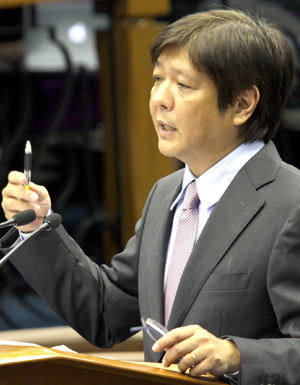
Q: You call 2013 “crazy.” Why?
A: There were many, many events that were unexpected. There were many game changers in 2013, both political, and even the typhoon (Yolanda). So many things happened in 2013. It will take these holidays for us to assess what’s the meaning of all these events. It has certainly been an eventful year, that’s for sure. Just in the last 6 months, all the things that happened, that’s more eventful than our normal year so I guess 2013 will be remembered for all those things: good and bad.
Q: What were the events of 2013 that had the most impact on you and the Senate?
A: Actually what we thought were major events starting with the PDAF scam, and then the Zamboanga uprising, everything took really a backseat to Yolanda because that cut across all. I call it the great equalizer. It cut across all [fields], political spectrum, all financial, economic, all the demographic, regional, everything. It just affected everyone in the same way, which is in a sense is really the way Filipinos are: that the suffering of one is the suffering of all.
We saw that very clearly in the Filipino culture, the Filipino spirit when Typhoon Yolanda hit. Although the other events were seen as regional or local events, this one was taken on by all Filipinos as something that happened to all of us, not only to the Waray, not only to the Visayas.
Q: Politics also figured into Yolanda. We saw your cousin, Tacloban Mayor Alfred Romualdez, testifying here at the Senate, and his feud with Interior Secretary Mar Roxas. What do you make of it?
A: I think nobody wants political factors to enter into that kind of activity because what we are talking about here are people who are in hardship, people who are in great need and when it comes to the question of life and death and survival, surely politics needs to take a backseat and that’s why it’s been the subject of great discussion. Like anything else that befalls us, we always come away with lessons learned and try to do better the next time.
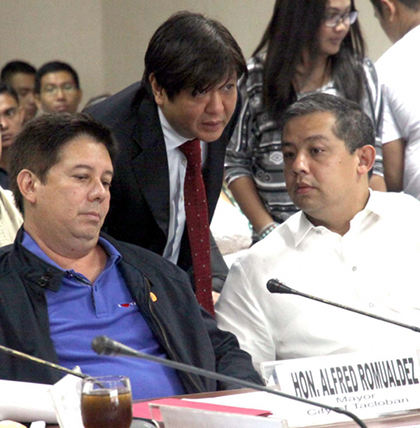
Q: After this crazy year, what do you think 2014 will bring?
A: I think that 2014, it’s very clear what is before us. If you want to call it my Christmas wish, I hope that because the elections of 2013 are over, the elections of 2016 are a long way off, let’s put aside our political concerns first and think about how to make the country stronger, how to rebuild the damage that has been caused by the disasters that have befallen us one after the other and how do we recover from that and how do we do better in case we have that kind of situation again. Hopefully we don’t but we must always hope for the best and plan for the worst.
I think a more multi-partisan approach to all that we’re doing is called for. That lesson has been made very clear to us. We can’t do this by one group, by one person, by one party, one region. The entire country has to come together and work together and that’s what’s going to bring us a better year next year.
Q: So no thoughts of 2016 yet?
A: Wala pa naman talaga eh! Malayo pa. (Not at all. It’s a long way off.)
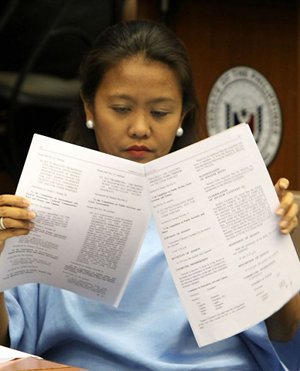 Nancy Binay: ‘I’m part of the system already’
Nancy Binay: ‘I’m part of the system already’
Q: You were an accidental candidate. How was 2013 for you?
A: Very life-changing, from a very private citizen to a new public figure. Now I’m doing more reading, actually medyo different (My life now is rather different). I came from an executive type of job with my father, the vice president, so mas ngayon desk job ang work. (My work now is more a desk job type.)
Q: How have the past months been like as a new senator and a political neophyte?
A: Yung expectations ko, ganoon naman talaga ang na-experience ko these past 6 months. I’m also familiar naman with how the Senate works. Siguro ang iba lang, ‘di na ako coming from the outside. I’m part of the system already.
(My expectations were the same as what I experienced these past 6 months. Maybe the only thing different is I’m no longer coming from the outside.)
Q: Were there aspects of the job that surprised you?
A: ‘Di naman sa ‘di inakala but for me ang biggest adjustment is learning how to compromise without sacrificing your principles. Wala namang big issue pero ganoon eh because this is a collegial body, kailangan may give and take for us to pass measures and be effective as a senator. Kailangan we need to learn how to compromise pero sa akin, as long as it doesn’t mean I have to sacrifice my principles.
(It’s not that I didn’t expect it but the biggest adjustment was learning how to compromise without sacrificing your principles. There is no one big issue but that’s how it is in a collegial body, there has to be a give and take for us to pass measures.)
Q: Your father challenged you to prove your critics wrong. Were you able to do that?
A: Ayoko mag-compliment myself. Siguro it’s best to ask other people if I was able to deliver these past 6 months. (I don’t want to compliment myself.)
Q: You drew much criticism the campaign. How would you assess the experience?
A: Medyo nakaka-culture shock. Sanay ako it’s another family member who’s getting attacked. Noong ako na ang tumakbo, ako na ang inaatake pero sanay na ako eh with my family na lagi kaming inaatake so it’s nothing new.
(It’s quite of a culture shock. I am used to seeing another family member who’s getting attacked. When I ran for office, I was the subject of the attacks but I’m used to it with my family always getting attacked.)
Q: What do you intend to do in 2014?
A: Ako, work, work, work. I need to deliver my campaign promise, how to help mothers, young kids. Little by little ko pa lang natutupad ang pangako ko during the campaign so I plan to… ‘yun pa rin same platform.
(It’s only little by little that I am delivering my promise during the campaign so that’s it, the same platform still.)
Q: There’s already a lot of talk about your father and his 2016 bid. How are you involved in that?
A: Wala, wala pa. Sa amin, trabaho ka lang nang trabaho. Ang priority ngayon is to do our job.
(None, none yet. To us, we just keep working. The priority now is to do our job.)
Q: What do you say to critics who remain unconvinced of your competence?
A: Wala (Nothing). Merry Christmas and a Happy New Year! – Rappler.com
Add a comment
How does this make you feel?
There are no comments yet. Add your comment to start the conversation.